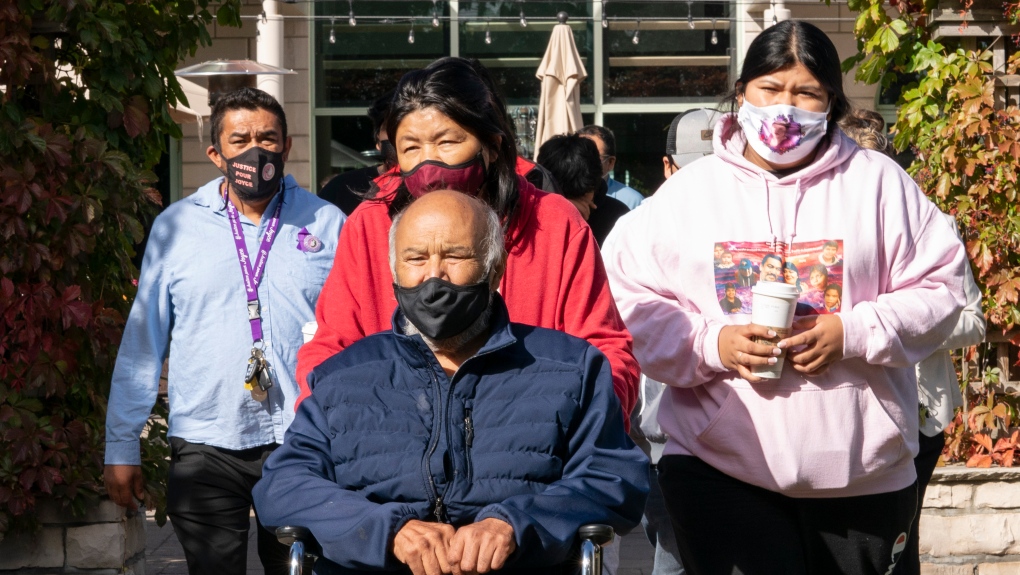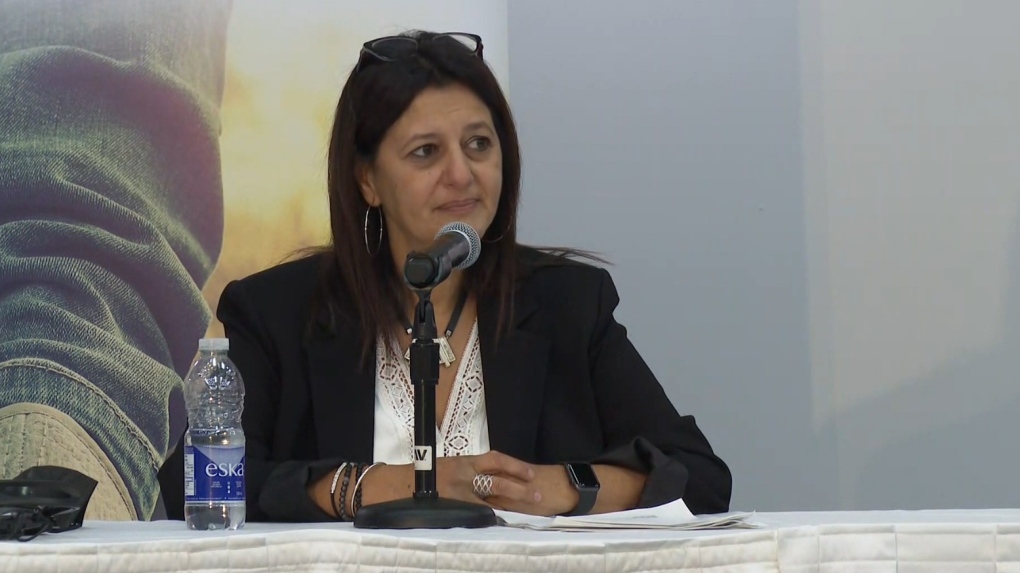Quebec coroner feels Joyce Echaquan would be alive if she were a white woman
Calling it an "undeniable" case of systemic racism, a Quebec coroner says Joyce Echaquan’s death was accidental, but avoidable.
When asked if she thought Echaquan would be alive if she were a white woman, coroner Gehane Kamel's response was simple and direct.
"I think so," she said.
Kamel addressed her findings Tuesday after issuing a report last week into the Atikemekw woman's death. She said racism and discrimination contributed to Echaquan's death and that the tragedy could have been prevented.
She also called on Quebec to recognize the existence of systemic racism in its institutions.
"I must confess in all sincerity that this public inquiry and some witnesses have shaken me," she said, recounting the events that led to the 37-year-old woman's death.
Echaquan, a mother of seven, filmed herself on Facebook Live as a nurse and an orderly were heard making derogatory comments toward her shortly before her death on Sept. 28, 2020, at a hospital in Joliette, Que., northeast of Montreal.
"From the first minute she entered the hospital, a label was placed on Ms. Echaquan," she said.
Kamel said medical staff, who assumed Echaquan was experiencing opioid withdrawal, failed to properly evaluate the medications she was taking and ignored the symptoms she described, including heart palpitations.
Later, after Echaquan became agitated and fell from bed twice, she was branded "theatrical" and strapped down.
Health-care workers didn't explore alternatives to calm her down or reassure her, such as calling the hospital's Atikamekw liaison officer, Kamel said.
'PERFECT EXAMPLE OF SYSTEMIC RACISM'
Calling it a "perfect example of systemic racism," a lawyer for Echaquan's family says they plan to file a civil lawsuit and a human rights complaint over her death.
"She was judged and not listened to and treated accordingly," said lawyer Patrick Martin-Ménard, speaking alongside Echaquan’s husband Carol Dubé at an afternoon news conference reacting to the report.
"It's clear to us that we have all the evidence."
Details of the civil case and complaint will be made public in the next few days, he said.
But Kamel's report is also important for the public at large, he said, to ensure "this [isn't] happening again," said Martin-Ménard.
"Today what’s most important was really to read the coroner’s report and make sure her recommendations are applied."
Dubé called for justice for his wife, the mother of his children.
"To see evidence of what our hearts told us is, to some degree, comforting," he said. "Joyce is dead because she was Indigenous."
Dubé, still, said he saw good in many health-care workers, thanking them by name.
“There are beautiful people ready to open themselves, work hard and wear their hearts on their sleeves,” he said. “I tell you that I believe in you to help us change things.”
 The family of Joyce Echaquan, Carol Dube, left, husband, Michel Echaquan and Diane Dube, her parents, and their daughter, Marie-Wasianna Echaquan-Dube, arrive to comment on the coroner's report on the death of Joyce Echaquan Tuesday, October 5, 2021 in Becancour, Que..THE CANADIAN PRESS/Ryan Remiorz
The family of Joyce Echaquan, Carol Dube, left, husband, Michel Echaquan and Diane Dube, her parents, and their daughter, Marie-Wasianna Echaquan-Dube, arrive to comment on the coroner's report on the death of Joyce Echaquan Tuesday, October 5, 2021 in Becancour, Que..THE CANADIAN PRESS/Ryan Remiorz
The family of Joyce Echaquan, Carol Dube, left, husband, Michel Echaquan and Diane Dube, her parents, and their daughter, Marie-Wasianna Echaquan-Dube, arrive to comment on the coroner's report on the death of Joyce Echaquan Tuesday, October 5, 2021 in Becancour, Que..THE CANADIAN PRESS/Ryan Remiorz
'CHILLS DOWN THE SPINE'
Kamel was visibly emotional while responding to questions, including moments where she choked back tears.
"In 2021 in Quebec, can we let someone die because this person is considered like an animal," she said.
"It's difficult what I'm saying here, but that is what I thought for a long time, and it will probably stay with me for a long time."
The video of Echaquan's treatment was shared widely online and drew outrage and condemnation. The final report into her death found her initial diagnosis was based on prejudice and she wasn't properly monitored before finally being transferred to intensive care.
Echaquan died of a pulmonary edema that was linked to a rare heart condition.
"Without the video, Ms. Echaquan would never have been heard. This observation sends chills down the spine," said Kamel.
Despite the coroner's recommendation, the Legault government has steadfastly denied that systemic racism exists in the province.
"We have witnessed an unacceptable death, and we must ensure that it is not in vain," said Kamel. "It is unacceptable that large sections of our society deny such a well-documented reality."
 Coroner Gehane Kamel
Coroner Gehane Kamel
Coroner Gehane Kamel become emotional speaking about Joyce Echaquan and her family, saying it was clear her death was a result of systemic racism.
HEALTH-CARE FAILINGS
While she maintains that racism played a part in Echaquan's death, Kamel noted that it wasn't the only factor.
She said emergency-room overcrowding and a lack of trained staff on the floor meant that there weren't enough people to supervise Echaquan once she was restrained.
There was also was a failure to notice and react quickly enough when her condition began to deteriorate, the coroner added.
She urged decision-makers to give equal weight to her other recommendations, which include better staff-to-patient ratios, improved communication between health authorities when it comes to patient medication, and more training for staff on racial sensitivity and standards of care.
LEGAULT DOESN'T RECOGNIZE SYSTEMIC RACISM
During a press conference Tuesday afternoon, Legault steered clear of recognizing systemic racism by saying he doesn't believe the "system as a whole" is discriminatory.
“I understand that the Indigenous people who have been victims tell themselves that there is systemic racism in Quebec. But the important thing is that it stops," he told reporters.
He said he was "shocked" by what happened to Echaquan in the hospital and that it was "unacceptable," but he denied her treatment was fuelled by systemic racism.
Instead, he explained that there groups of people who believe there is systemic racism in Quebec and those who don't.
"I think they don't use the same definition. I think that they use a kind of definition saying that, for example, in Joliette, they were more than one individual, so there were a group," he said.
"And because they were a group, they call that a system, but, for me, a system is all the system. And, for me, it doesn't apply to this situation in Quebec."
Legault defined system racism as a communicated effort to be discriminatory that comes "from above." In his view, he said, there has been systemic racism once before -- when children were taken from their families to residential schools.
But those days are over, he said.
"Is there something that starts from above and that is communicated throughout the health network, saying 'be discriminatory in your treatment of Indigenous people?'" he asked. "The answer is no."
The premier said he did recognize that certain employees in the health-care network have "discriminatory approaches" and, to that end, he welcomes the documentation of discrimination of people when receiving health-care services -- a recommendation of the Viens Commission.
Atikamekw Nation Grand Chief Constant Awashish said "the premier is wrong” when it comes to systemic racism.
"We are living this reality, and this reality is proof," he said. "It's a question of humanity and justice for all Indigenous people."
Awashish said he looks to Dubé as a role model.
"I try to keep this same state of mind," and work in a "positive manner," he said.
"To me there’s still a lot of work to do and to do it, we need everyone’s support."
CORONER GOT TOO POLITICAL, SAYS PQ
The leader of the Parti Québécois, Paul St-Pierre Plamondon, however, said Tuesday that Kamel overstepped her job by recommending that the government recognize systemic racism.
Kamel showed "ideological bias" and drew "sociological conclusions," in her report, the party leader said.
She should instead, he said, simply draw "factual" conclusions about the circumstances of the death. "This goes further than a coroner's mandate," he said Tuesday at a press briefing at the National Assembly.
Bloc Québécois leader Yves-François Blanchet agreed. But the two other main provincial opposition parties took the opposite stance.
Quebec Liberal leader Dominique Anglade and the spokesperson for Québec Solidaire, Gabriel Nadeau-Dubois, both said they found the coroner perfectly within her right to demand that systemic racism be recognized.
"If this coroner judges that racism is a cause of this death, it is not only her mandate, it is her legal and moral responsibility to say so," said Nadeau-Dubois.
"If it upsets some politicians, that's up to them. The coroner is doing her job and it's up to us now to decide what to do with these observations," he said.
-- With files from The Canadian Press
CTVNews.ca Top Stories

Conservatives call for no-confidence vote by late January
Conservative MP Jonathan Williamson says he'll get the ball rolling early in the New Year on no-confidence vote that could bring down Prime Minister Justin Trudeau's government in a little more than a month.
Northern Ont. police shoot man carrying a shotgun on Hwy. 11/17
The province’s Special Investigations Unit is investigating after a police office near Thunder Bay, Ont., shot and wounded a man who fired on a police cruiser with a shotgun.
9-year-old girl dead in Calgary Boxing Day crash
A nine-year-old girl has died in hospital after the vehicle she was in was struck by a driver in a stolen vehicle fleeing from police.
Freezing drizzle, low of -30 C: Mix of wintry weather in the forecast across Canada
From freezing rain to brutal cold, wintry conditions are in the forecast across Canada this weekend.
Ukrainian drone attack was underway before Azerbaijani plane crashed, Russian aviation chief says
Russia's aviation chief said Friday that a Ukrainian drone attack was underway in the Russian region that an airliner was destined for before it diverted and crashed earlier this week.
Bloc Quebecois as official Opposition? Leader says Canadians 'don't have to fear us'
Bloc Quebecois Leader Yves-Francois Blanchet says he's staying modest about the prospect of his party forming official Opposition in the next federal election, though it would be a 'spectacular' result.
LeBlanc, Joly to meet with incoming Trump administration officials in Florida
Finance Minister Dominic LeBlanc and Foreign Affairs Minister Mélanie Joly are in Florida to meet with officials from president-elect Donald Trump's incoming administration.
Another stowaway is caught on a Delta flight this holiday season – raising major concerns about airport safety
Yet another stowaway managed to board a major airline’s plane – renewing serious questions and concerns about airport safety during the busiest travel season of the year.
B.C woman awarded nearly $750K in court case against contractor
A B.C. woman has been awarded nearly $750,000 in damages in a dispute with a contractor who strung her along for a year and a half and failed to complete a renovation, according to a recent court decision.

































